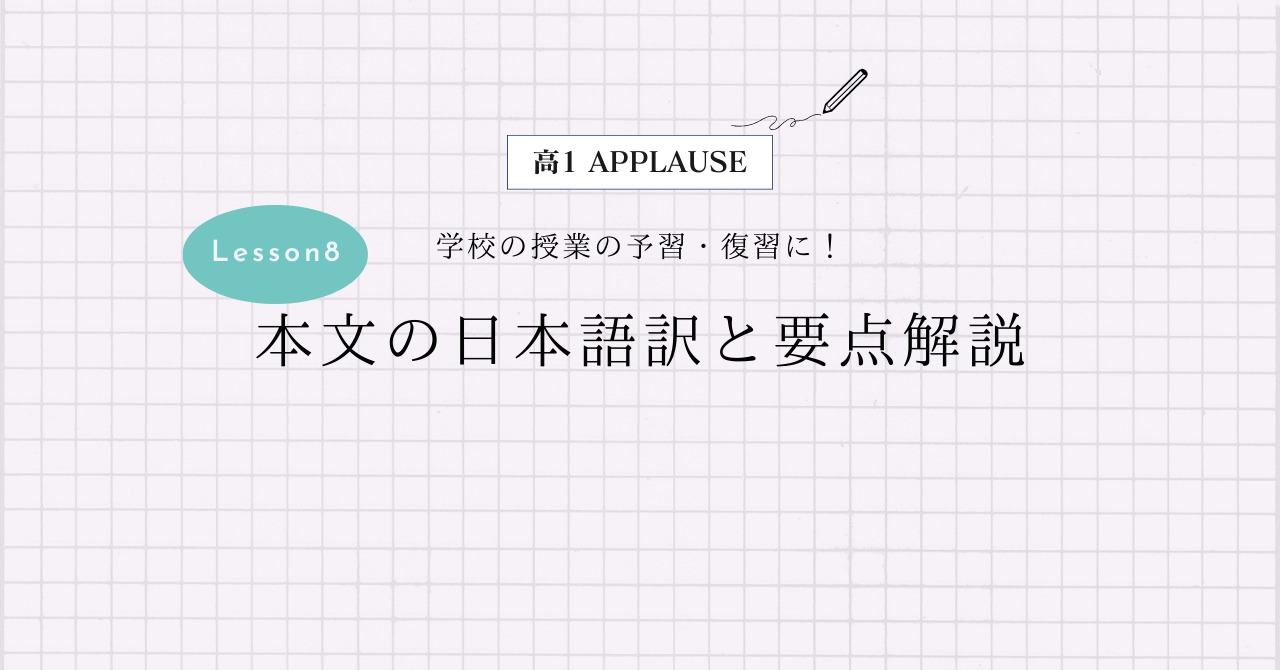開隆堂 高1APPLAUSE Lesson7 Section3の本文の日本語訳と重要箇所の解説です。
Lesson7-1, 7-2の解説はこちらからご覧ください。
>高1APPLAUSE Lesson7 Section1 本文和訳
>高1APPLAUSE Lesson7 Section2 本文和訳
- APPLAUSE Lesson7 Section3 本文と日本語訳
- APPLAUSE Lesson7 Section3 重要事項の解説
- In contrast with his reputation today, Vermeer didn’t necessarily succeed as a painter in life.
- He had eleven children, and they had a lot of debt.
- One of his works was on a wall in a bakery.
- It is said that he handed over his works to pay for the bread.
- In fact, he sold many of his works very cheaply to earn a living.
- Even about 200 years after his death, “Girl with a Pearl Earring” was sold for only two guilders and 30 cents.
- Many of his works gradually became valuable long after he died.
- Today, it is quite a famous painting whose value is priceless.
- Salvador Dali, a Spanish artist, said,
- “Vermeer had the enthusiasm and distress to make what is already perfect even more perfect.”
- Why don’t you see his masterpieces first-hand?
- APPLAUSE Lesson7 Section3 まとめ
APPLAUSE Lesson7 Section3 本文と日本語訳
In contrast with his reputation today, Vermeer didn’t necessarily succeed as a painter in life.
「今日の彼の評価とは対照的に,フェルメールは必ずしも人生で画家として成功していたわけではありませんでした。」
He had eleven children, and they had a lot of debt.
「彼は11人の子どもがいて,彼らには多額の借金がありました。」
One of his works was on a wall in a bakery.
「彼の作品の1つがあるパン屋の壁に掛かっていました。」
It is said that he handed over his works to pay for the bread.
「彼はパンの代金を支払うために自分の作品を譲り渡したと言われています。」
In fact, he sold many of his works very cheaply to earn a living.
「実際に,彼は生活費を稼ぐために作品の多くをとても安く売っていました。」
Even about 200 years after his death, “Girl with a Pearl Earring” was sold for only two guilders and 30 cents.
「彼の死から約200年経った後でさえ,『真珠の耳飾りの少女』はたった2ギルダー30セントで売られました。」
Many of his works gradually became valuable long after he died.
「亡くなってからかなり後に,彼の作品の多くは徐々に価値が高くなりました。」
Today, it is quite a famous painting whose value is priceless.
「今日では,それは価値が付けられないほど相当有名な絵です。」
Salvador Dali, a Spanish artist, said,
「スペインの画家であるサルバドール・ダリは言いました。」
“Vermeer had the enthusiasm and distress to make what is already perfect even more perfect.”
『フェルメールにはすでに完璧なものをなお完璧にしようとする熱狂と苦悩があった。』
Why don’t you see his masterpieces first-hand?
「自分の目で彼の名作を見てはどうですか?」

APPLAUSE Lesson7 Section3 重要事項の解説
In contrast with his reputation today, Vermeer didn’t necessarily succeed as a painter in life.
“in contrast with~”は「~と対照的に,対比して」という重要表現で,“reputation”は「評価,評判」という名詞です。
“necessarily”は「必ず」という副詞で,否定文で使うと「必ずしも~ではない」という意味になります。
“succeed”は「成功する」という動詞で,“as”は「~として」という前置詞ですね。
“life”は「人生,生活,生命」といった名詞です。
He had eleven children, and they had a lot of debt.
“they”は“He and eleven children”を指しています。
“debt”は「借金」という不可算名詞です。“a lot of~”は「たくさんの」という意味ですが,可算名詞にも不可算名詞にも使うことができますよ。
One of his works was on a wall in a bakery.
“one of 複数名詞”は「名詞のうちの1つ」という表現です。
“work”はここでは「作品」,“wall”は「壁」,“bakery”は「パン屋」という名詞ですね。
前置詞”on”は「~の上に」と訳すことが多いと思いますが,イメージは「接着」です。今回のように「壁に掛かっている」という意味でもよく使うので,イメージをしっかり掴んでおきましょう。
It is said that he handed over his works to pay for the bread.
“it is said that~”は「~だと言われている」という「受動態」の表現になります。
“it”は形式主語で,”that”以下の内容が真の主語です。
“hand over”は「を手渡す,譲り渡す」,“pay for~”は「~の代金を支払う」という意味になります。
“to pay”は「不定詞の副詞的用法」になっていますね。
“bread”は「パン」という名詞です。
In fact, he sold many of his works very cheaply to earn a living.
“in fact”は「実際は」という重要な表現です。
“sold”は“sell(を売る)”の過去形で,“many of~”は「~の多く」といった意味になります。
“cheaply”は「安く」という副詞ですね。
“earn”は「を稼ぐ」という動詞で,“earn a living”で「生活費を稼ぐ」という意味です。
また,“to earn”は「不定詞の副詞的用法」になっていますね。
Even about 200 years after his death, “Girl with a Pearl Earring” was sold for only two guilders and 30 cents.
“even”は「~でさえ」という強調を表す副詞です。
“after”は「~の後」という前置詞で,“death”は「死」という名詞ですね。
また,この文は「受動態」が使われていて,“sell for~”は「(~という価格で)売る」という表現になります。
“guilder”はかつてオランダで使われていた通貨です。
Many of his works gradually became valuable long after he died.
“gradually”は「次第に,徐々に」という副詞です。
“became”は“become(になる)”の過去形で,“valuable”は「価値のある」という形容詞になります。
“long after~”は「~のかなり後で」という表現で,“die”は「死ぬ」という動詞ですね。
Today, it is quite a famous painting whose value is priceless.
“it”は“Girl with a Pearl Earring”を指しています。
“quite a~”は「かなり,相当」という副詞表現で,“famous”は「有名な」という形容詞ですね。
“whose”は「所有格の関係代名詞」で,“whose value is priceless”が先行詞“painting”を修飾しています。
“value”は「価値」という名詞で,“priceless”は「値段がつけられないほど高価な」という形容詞です。
直訳すると「それは価値が値段がつけられないほどの相当有名な絵です」となります。
2文に分けると,“Today, it is quite a famous painting.”と“Its value is priceless.”ですね。
Salvador Dali, a Spanish artist, said,
“Salvador Dali”と“a Spanish artist”は「同格語」になります。“名詞,名詞”の並びは「同格語」の可能性が高いですよ!
“Vermeer had the enthusiasm and distress to make what is already perfect even more perfect.”
この文は教科書に訳が載っているのでその通り訳しましたが,一応細かく解説します。
“enthusiasm”は「熱狂,熱意」,“distress”は「不安,苦悩」という名詞です。
“make 名詞(A) 形容詞/名詞(B)”で「AをBにする,させる」という重要表現ですね。また,ここでは「不定詞の形容詞的用法」になっていて,“the enthusiasm and distress”を修飾しています。
“what”は「関係代名詞」で,“the thing which~(~なもの・こと)”と同じ意味を持ちます。
つまり“what is already perfect”は,“the thing which is already perfect”という「主格の関係代名詞」を使った文となり,「すでに完璧なもの」と訳します。
“already”は「すでに」という副詞で,“more perfect”は「比較級」になっていますね。
Why don’t you see his masterpieces first-hand?
“Why don’t you 動詞の原形?”は「~するのはどうですか?」という重要表現で,“how about~?”と同じ意味です。
“masterpiece”は「名作,傑作」という名詞で,“first-hand”は「自分の目で,直接」といった副詞になります。
APPLAUSE Lesson7 Section3 まとめ
以上がAPPLAUSE Lesson7 Section3の日本語訳となります。
「関係代名詞」「不定詞」などの文の作り方を確認しておきましょう!
>高1APPLAUSE Lesson7 Section1 本文和訳
>高1APPLAUSE Lesson7 Section2 本文和訳
何か分からない点や他に解説してほしい点があれば,お気軽にコメントしてください!




コメント